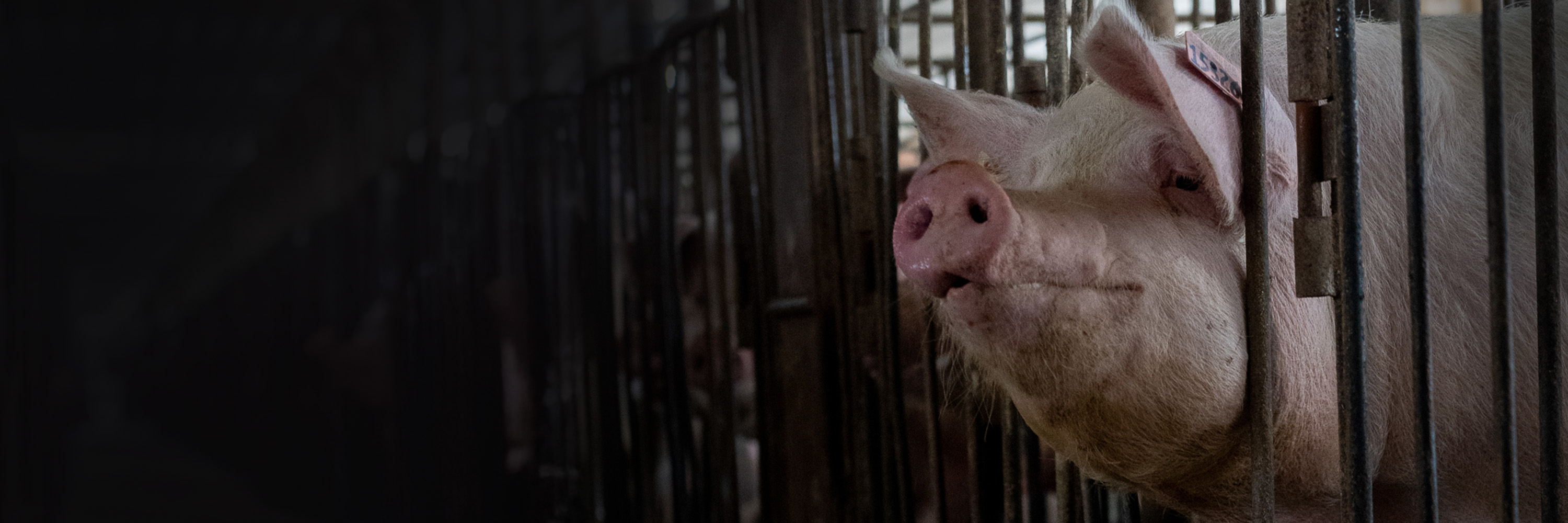
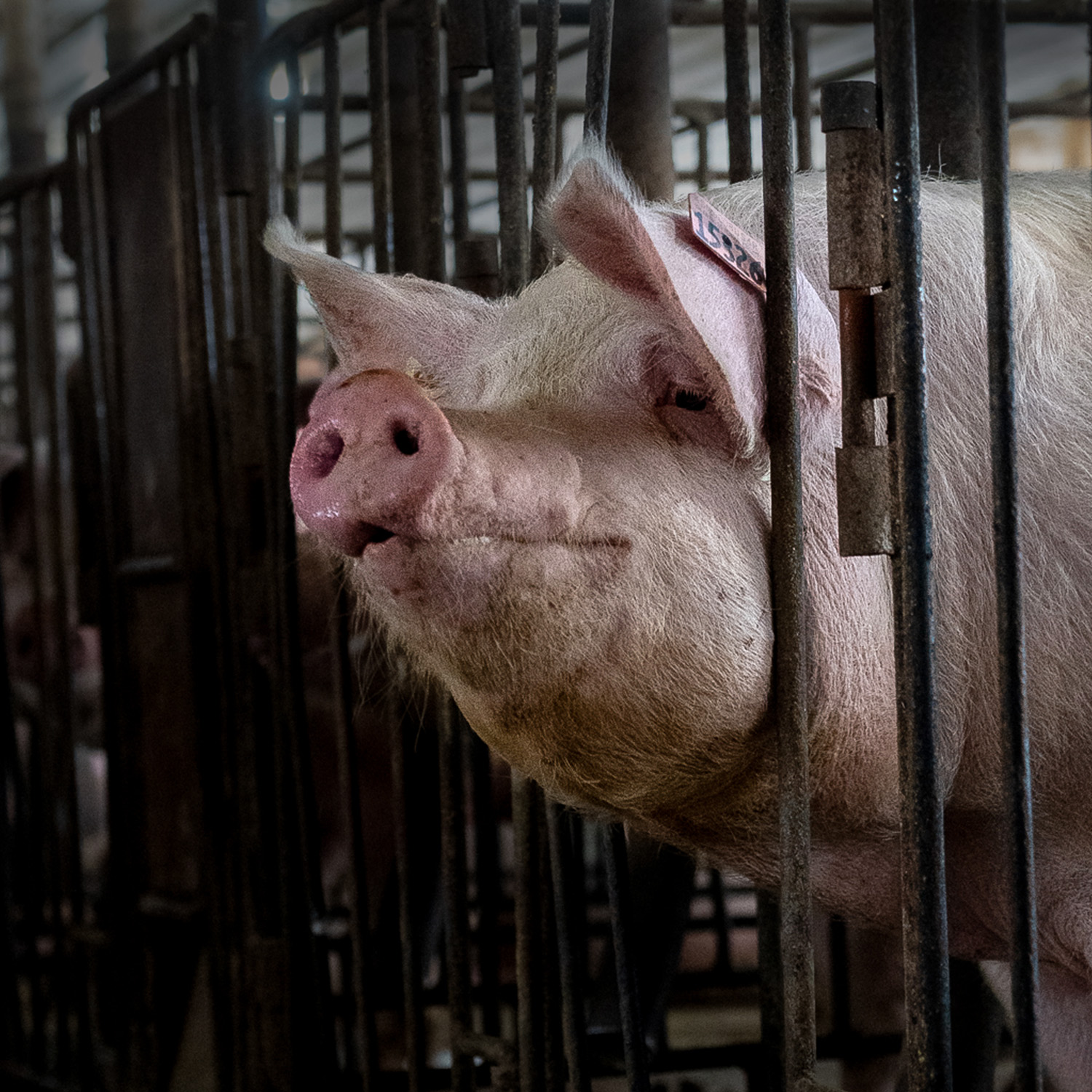
Investigation: Caged pigs exposed on farm tied to major US grocers
Animal Equality’s latest exposé of a US pig farm linked to major supermarket chains reveals extreme animal cruelty. Footage shows pigs trapped in tiny cages, dead piglets on filthy floors, and pigs engaging in repetitive, stress-induced behaviours.
Animal Equality’s latest exposé of a US pig farm linked to major supermarket chains reveals extreme animal cruelty. Footage shows pigs trapped in tiny cages, dead piglets on filthy floors, and pigs engaging in repetitive, stress-induced behaviours.
- Animal Equality investigated a Kansas pig farm linked to Ahold Delhaize, the parent company of Stop & Shop, Giant, and Food Lion.
- Pregnant pigs were locked in crates so small they couldn’t turn around for nearly four months at a time.
- Footage showed dead piglets, pigs with wounds, and stress behaviours like chewing the air. Some pigs were too big for the crates and got stuck under the doors.
- One pig nudged her dead companion; another was shot in full view of other pigs.
- In the US, about 3.5 million pigs are kept in gestation crates condemned by experts as extremely cruel.
- Ahold Delhaize’s brands promised to ban crates nearly 10 years ago. It has delayed action until 2028.
A new exposé by Animal Equality has revealed animal cruelty at a Kansas pig breeding facility linked to Ahold Delhaize – the parent company of US supermarket stores including Stop & Shop, Giant, and Food Lion.
The 2024-2025 footage shows pregnant pigs locked inside gestation crates – metal cages so small they couldn’t turn around or take more than a single step. For nearly four months at a time, the animals were forced to struggle against the bars, desperate for even a hint of movement.
The video reveals a pattern of suffering: piglets dead on the floors, mothers with open wounds, and signs of severe psychological stress. Pigs were seen chewing the air, trying to escape, or lying still and unresponsive.
Confinement triggers abnormal behaviour in pigs
Many pigs were covered in bloody sores where the metal bars dug into their skin, left vulnerable to infection on faeces-covered floors. Some showed signs of prolapsed organs after repeated pregnancies.
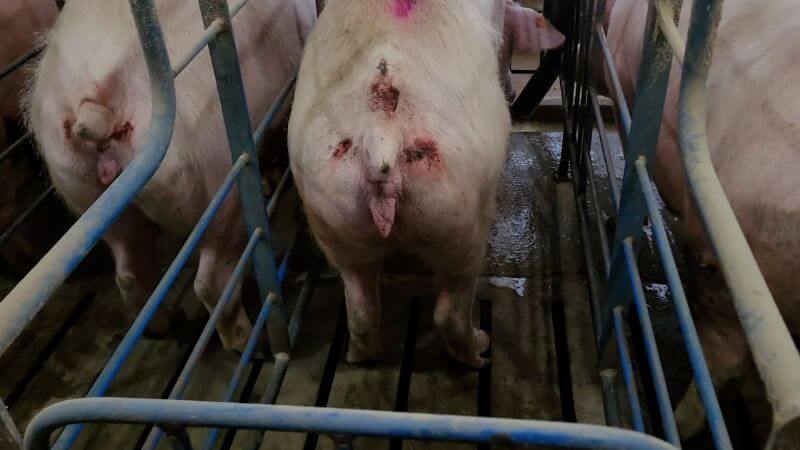
Several pigs were too large for the crates and struggled to move. Some wedged their faces beneath the cage doors in search of space. One pig became stuck and screamed until a worker intervened.
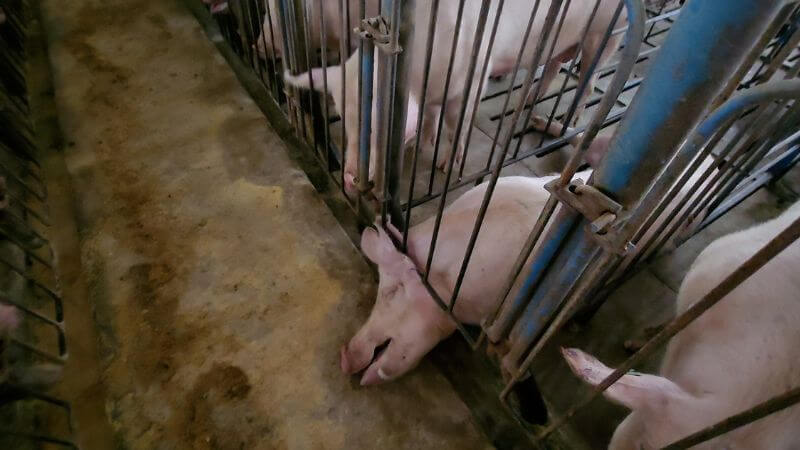
Our investigator also observed repetitive behaviours, many of which are stress-induced. Some pigs bit the bars or chewed the air. Others pushed their bodies into the backs of their crates repeatedly.
Some screamed. Others lay still, pressed against the metal – silent and unresponsive. A few tried to climb the bars, pawing at the air.
Piglets and mothers die behind bars
Investigators documented premature piglets born inside gestation crates, many of whom died within an hour. Their mothers, trapped in cages too small to turn around, could not see or reach their dead piglets.
Outside the facility, the decaying bodies of discarded piglets were filmed on the ground and in wheelbarrows. These piglets had been removed from the farm floors as part of the workers’ regular duties.
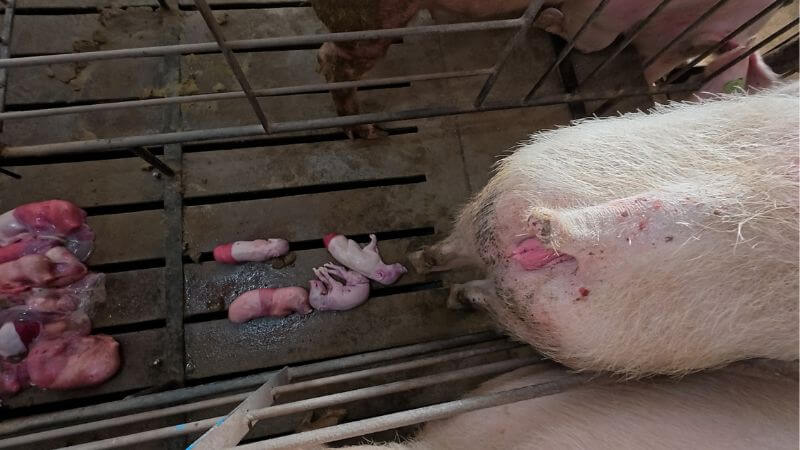
Adult pigs also died prematurely on this farm. In one scene, a pig nudged the body of her dead companion, appearing to search for a response.
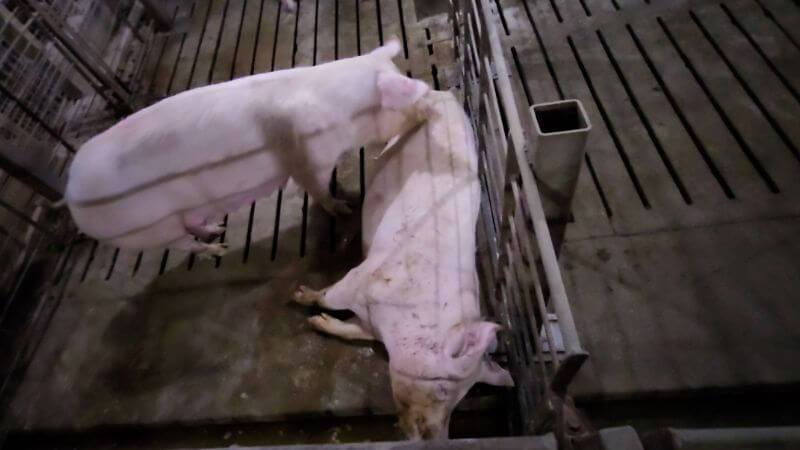
In another, a wounded pig was shot with a captive bolt gun and left to die in a holding pen while others looked on, unable to turn away.
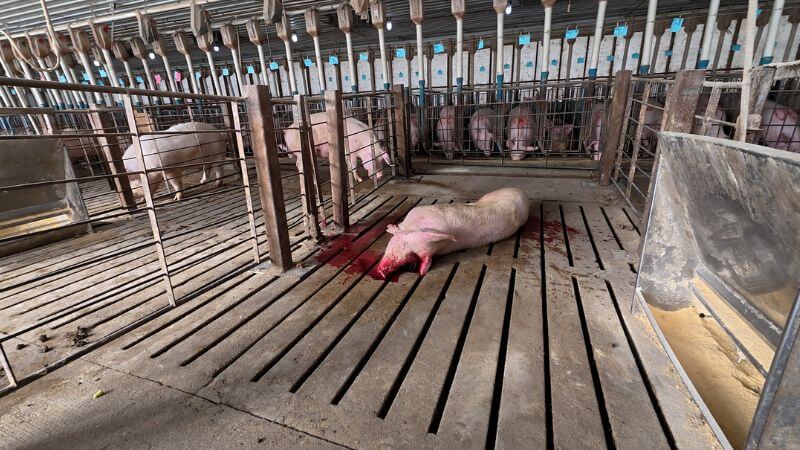
Gestation crates face global controversy
Across the United States, an estimated 3.5 million mother pigs are confined in gestation crates.
Experts have condemned them as “one of the cruelest forms of confinement devised by humankind”. Some have compared this extreme confinement to spending months in an airplane seat.
When it’s time to give birth, pigs are moved to slightly different enclosures known as farrowing crates. After nursing their piglets, they’re returned to gestation crates to start the cycle again.
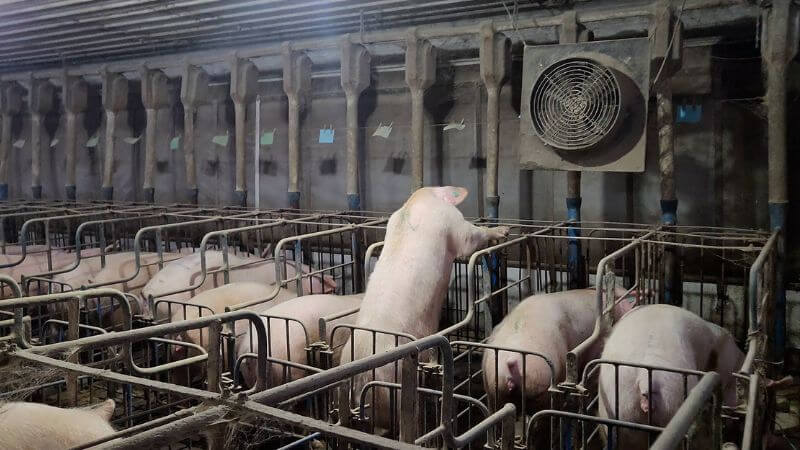
The only time these animals walk is between cages – and eventually, to slaughter.
Pigs are bred repeatedly until their bodies can no longer meet industry demands. Then they’re killed and replaced with younger animals.
Despite growing public criticism and bans in several US states and countries, including the UK, gestation crates remain common across the pig farming industry. In some barns, more than a thousand pigs are lined up in crates just slightly wider than their bodies.
Who’s holding Ahold Delhaize accountable?
Ahold Delhaize continues to allow gestation crates in its US supply chain, prompting global backlash.
Nearly ten years ago, some of the company’s brands promised to stop using gestation crates. Ahold Delhaize reaffirmed that promise in 2020. It has made little progress since then and has shared no clear updates.
The company has now delayed its deadline to 2028. Even then, the change will apply only to some products.
While Ahold Delhaize has made improvements in Europe – mainly due to stronger laws – its US operations still rely on extreme confinement. Other grocery companies have already stopped using gestation crates. Some of Ahold Delhaize’s own brands in Europe have, too.
In response, Animal Equality launched a campaign for accountability. This includes secondary campaigns against Pandora Jewellery and Symrise – two companies that share board member, Jan Zijderveld, with Ahold Delhaize.
Zijderveld sits on the Supervisory Board that oversees the company’s animal welfare policies.

Demonstrations have taken place in the US, Germany, Italy, the Netherlands, Spain, Denmark and the UK. Meanwhile, advocates have been emailing company executives and flooding social media.
Join them today. Tell Ahold Delhaize that delays cost lives.
Shifting demand away from cages
This system exists to meet demand for pig meat – but that demand is shifting.
Across India, plant-based options for meat, dairy, eggs, etc are becoming easier to find and prepare. Many fit seamlessly into everyday meals.
For those concerned about animal suffering, choosing plant-based foods is the most effective way to end confinement.
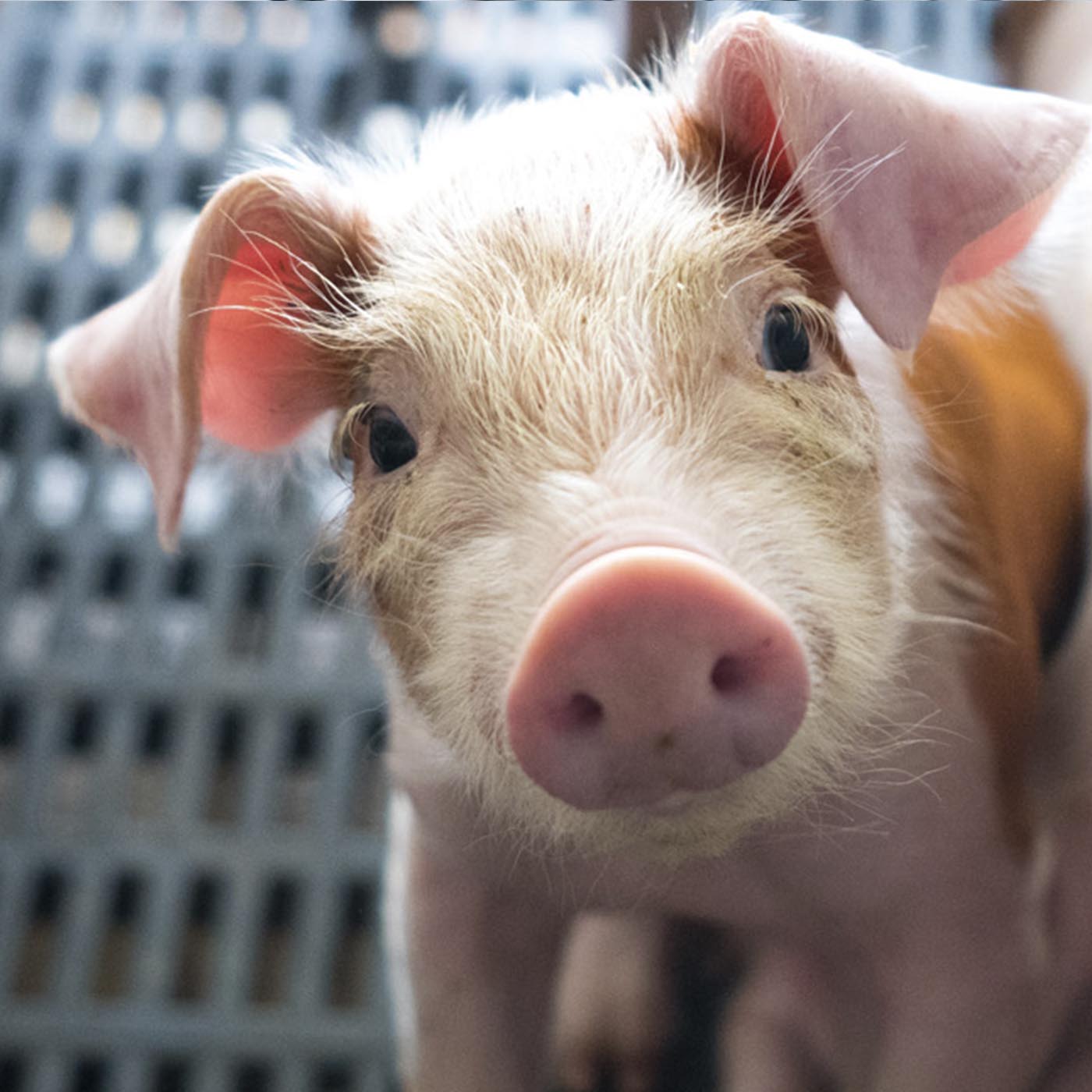
NURTURE CURIOSITY
Pigs are highly social animals who are often considered smarter than dogs. You can protect these intelligent animals by simply choosing plant-based alternatives.
